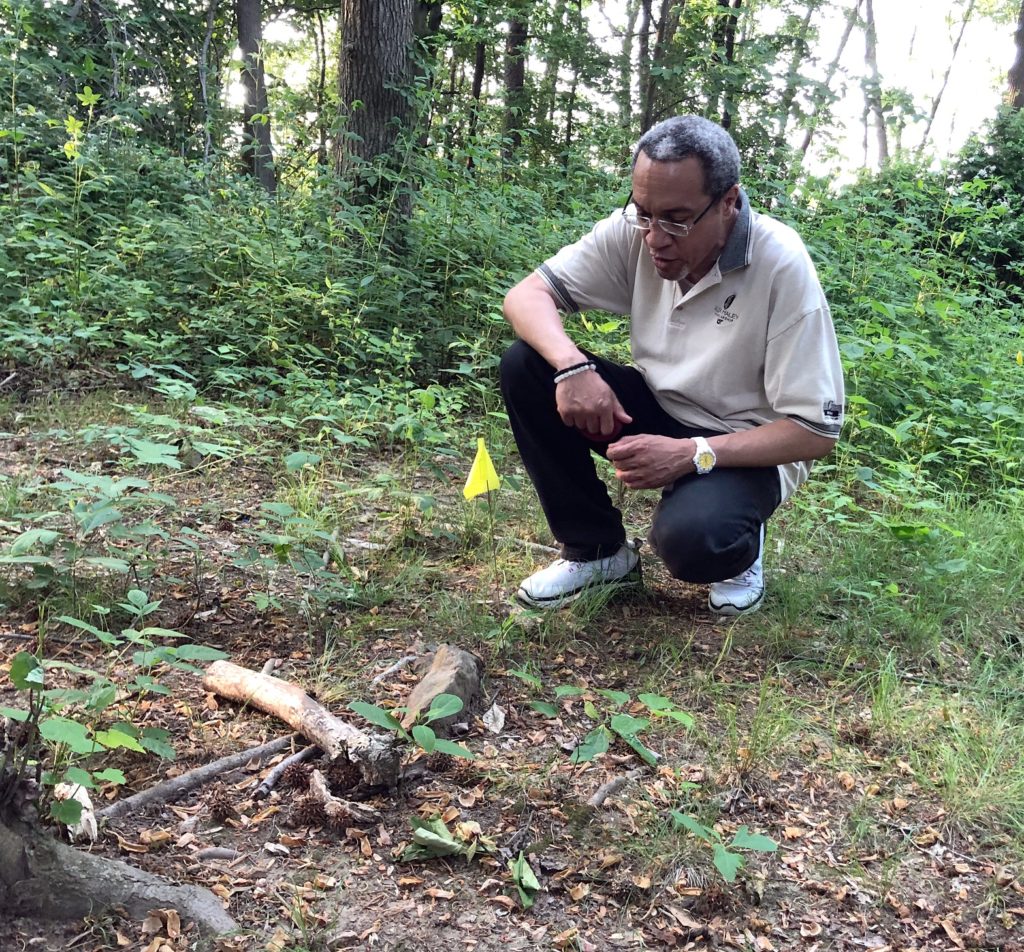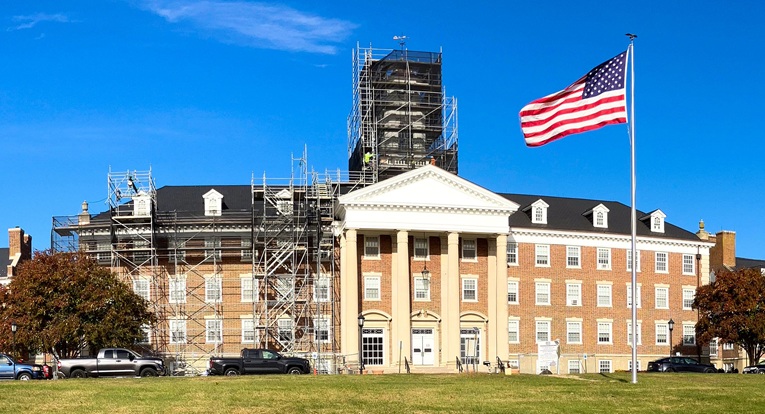There didn’t seem to be a better place to walk with Chris Haley and to talk about his powerful new film Unmarked than among Greenbelt’s own unmarked stones at the historic Turner Cemetery. We met there late one Sunday afternoon to talk about the documentary, which explores the search for the burial places of enslaved people and the critical efforts being made to preserve and to honor those graves. The 40-minute film looks particularly at efforts being made in Virginia as well as at the site of the former Belvoir Plantation in Crownsville, Md.
“How can we forge ahead without remembering that this country enslaved its own people?” the film asks as it reminds us, in the words of Dr. Lynn Rainville, that those people held in slavery “are founders.”
“They deserve honor,” Reverend Michelle Thomas says in the film. “To honor their burial sites is to honor their lives, is to honor their work and is to honor their immense, foundational contributions,” said Thomas.
“There’s a perception that slavery was in the Deep South,” Haley explained to me as we walked, describing how occasionally people will express surprise to learn there was slavery locally. “It’s a misnomer to excuse Maryland from the reality of its history.” Standing on the site of the former Turner plantation it was impossible not to feel the heavy weight of Maryland’s history.
Although Haley does not live in Greenbelt, the city is part of the film’s origin story, as the Utopia Film Festival is what brought the two co-directors, Haley and Brad J. Bennett, together.
Haley was approached by Bennett, who had already begun a project in Central Virginia where he is from. Bennett had read about “ill-preserved burial sites and the people bringing back respect to what one would think would be in place, or what should be in place for any place that is a final resting place,” Haley explained. Bennett entered a film in the 2017 Utopia Film Festival. Forgive – Don’t Forget won that year’s Utopian Vision Award. Bennett ultimately invited Haley to join him for his next project, Unmarked. “Really, he gets all the credit for coming up with the idea of it,” Haley said of Bennett. “And I’ve been so happy to be part of it.”
How gravesites are cared for and preserved matters. The film clearly shows the inequities between how the graves of those held in slavery have been treated by the cities, towns or institutions where they are located as compared to those that hold the remains of slave-holders and their descendants. To disregard the cemetery is to continue to disrespect the lives of the people who were enslaved and to continue the injustice they experienced. The men and women engaged in efforts to find, reclaim and respect those sites not only honor the dead but find connection to relatives, family stories and meaningful history.
This is a journey that could go on indefinitely. There are hundreds of thousands of such sites and Haley has already heard from people who would like the crew to go deeper with the stories they’ve highlighted. The film was recently written up in The Guardian, expanding the project’s reach, with the filmmakers being asked to tell the stories of other locations in states all over the nation. Funding is necessary for such further work.
Haley and I talked about how, once one starts paying attention, the search for these gravesites and their stories leads everywhere. “I am of the mindset now that because of this movie and because of what it reminded me of … I go to any place where there is a large plantation, where the person who owned the plantation was a slave-holder … there’s a part of me where my eye starts scanning the ground and I think, ‘I wonder where the people who were enslaved here are, I wonder where they are buried.’ It’s a part of me now.”
In addition to the importance of the Utopia Film Festival in bringing the co-directors together, Haley noted that some Greenbelters supported the film and “helped us get to where we are today.” These contributions are not small; not long before we walked together, Haley had learned the film had been nominated for an Emmy Award. For more information about this year’s Capital Emmys, follow @capitalemmys on Twitter or visit capitalemmys.tv/emmys and tune in on June 26 when winners are announced.
Haley is a man of many accomplishments. He is the director of the Study of the Legacy of Slavery in Maryland at the Maryland State Archives. He served as keynote speaker for the 2020 Greenbelt Black History event. In addition to being a historian, speaker and filmmaker, he is an actor, writer, and director of Greenbelt’s Utopia Film Festival, and poet, with a published collection of LGBTQ-themed poetry, Until the Right One Comes Along. To learn more about Haley, get a copy of his book and look at his other upcoming projects, visit ChrisHaleySpeaks.com. To watch Unmarked and to learn more about it, visit unmarkedfilm.com.




